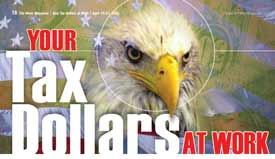Missing the point #1
 Image from Wave Magazine.
Image from Wave Magazine.Today's Washington Times reviews the book Buck Wild: How Republicans Broke the Bank and Became the Party of Big Government. The Cato Institute bookstore describes the book thusly:
A scathing look at how the Republican Party, once the paragon of fiscal conservativism, has embraced Big Government and become even more irresponsible with taxpayer money than the Democrats.
But Republicans were never against big government necessarily. The issue is who benefits (cui bono) from government spending.
Ross Perot built his empire on government computing contracts. cf. Halliburton and other military contractors, etc. Sprawl was enabled by the Interstate Highway system -- "10 cent dollars" where 90% of the cost was borne by the federal government. And the road builder and automobile lobby tends to benefit from government, and votes Republican (you don't meet many car dealers that vote Democrat, although there are a few...) etc.
Republicans prefer that business benefit from government largesse, although they would call this development in infrastructure and "hard" collective goods such as the national defense; while Democrats tend to focus on socially-oriented "collective goods" more likely to be directed to individuals.
At the local level, sociologist Harvey Molotch argues, in City as a Growth Machine: Toward a Political Economy of Place:
A city and, more generally, any locality, is conceived as the areal expression of the interests of some land-based elite. Such an elite is seen to profit through the increasing intensification of the land use of the area in which its members hold a common interest. An elite competes with other land-based elites in an effort to have growth-inducing resources invested within its own area as opposed to that of another. Governmental authority, at the local and nonlocal levels, is utilized to assist in achieving this growth at the expense of competing localities. Conditions of community life are largely a consequence of the social, economic, and political forces embodied in this growth machine.
This is why most local politics revolves around land use, and why developers and the forces aligned with them (automobile, finance, legal profession, etc.) tend to be heavily involved in the electoral process, especially in funding "like-minded" candidates.
Did you see the article in one of the local papers, about how developers who had supported other candidates in the primary are now send "love notes" -- donations -- to the candidates who are likely to win?
Certainly the campaigns this year in Montgomery County Maryland have focused on which candidates are more beholden to developers. And as long as I've lived in the area, I think this has been an issue in Loudoun County in Virginia--sometimes the developer candidates accede to the throne (money helps) and other times it's the people more focused on impact from "growth" on the here and now...
 For most suburban localities, economic development centers on land use and the construction of housing.
For most suburban localities, economic development centers on land use and the construction of housing.Index Keywords: Growth-Machine



0 Comments:
Post a Comment
<< Home